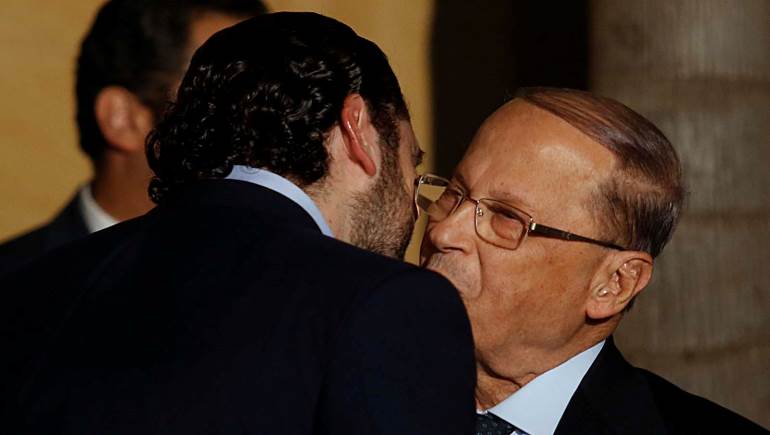A Saudi-Iranian tug of war over Lebanon
Dalal Saoud/The Arab Weekly/December 11/16
Beirut – Less than a year after Saudi Arabia made the dramatic decision to abandon Lebanon, suspending military aid worth $4 billion and leaving Beirut on its own, the kingdom seems to have shifted its position. Letting Lebanon fall under Iran’s complete control was not a good idea after all.
Sending special envoys in November to bless Sunni leader Saad Hariri’s move to back Hezbollah’s ally and strong Christian leader Michel Aoun as Lebanon’s president and congratulating and inviting Aoun to visit Riyadh were the first signs of a changing Saudi mood.
Aoun’s inauguration speech, which stressed the need to dissociate Lebanon from external conflicts and to adopt an independent foreign policy based on the country’s higher interests and the respect of international law, was encouraging. Saudi Prince Khalid al-Faisal, who headed a high-level delegation to a November meeting with Aoun, invited the Lebanese president to visit Riyadh.
Aoun emphasised the need to strengthen Saudi-Lebanese ties and promised to visit the Saudi capital after a new Lebanese cabinet was in place. That promise, however, raised eyebrows within Hezbollah- Iran-Syria circles since dedicating his first official visit to Riyadh would be considered a move in favour of Saudi Arabia. Hezbollah Secretary-General Sayyed Hassan Nasrallah made a point in appearing on television to dismiss friction with Aoun and downplay concerns over the Saudi November visits. While the president is “trusted” and Hezbollah ‘”is not to veto” his Riyadh trip, Nasrallah stressed that “the other party” should also not place any veto on Aoun travelling to Syria or Iran.
Countering Iran’s influence over Lebanon is probably the reason behind renewed Saudi interest in the tiny Arab country. However, it was premature to know how far the Saudis would go to drag Lebanon back to their and the Arab fold.
The Saudis realised that leaving Lebanon completely was not in their interests, noted Riad Tabbarah, a former Lebanese ambassador to the United States. “They found out that if they don’t go back to Lebanon, the country will become 100% Iranian and Iran will have the final say.”
Referring to Saudi Arabia’s internal debate “to do the right thing and how to confront Iran”, Tabbarah said those who advanced the argument that confrontation should not be limited to Yemen but extended to other places, such as Syria and Lebanon, won the day.
Aoun’s election after two-and-a-half years of a presidential vacuum, mainly blamed on Hezbollah and him, moved the stagnant waters and “proved to the world that there is something other than Hezbollah”, with a new head of state and government institutions back on track, said a well-placed Lebanese official who requested not to be named.
“The Saudis are saying we are with the Lebanese state… When it regains its strength, we will be by your side,” the official said.
That clearly means standing up to Hezbollah’s and Iran’s growing influence — a rather risky and delicate task due to the country’s fragile confessional and political balance.
“Aoun is convinced that he won’t be able to rule without (Saudi ally) Hariri while Hezbollah and Iran have interest in maintaining stability in the country and preserving the support of Aoun and of his Christian base,” the official said.
The Saudis have started “a process to come back to Lebanon and bring back Lebanon to them”, Tabbarah said.
“A tug of war” between the Saudis and Iranians is developing, he said, “with one side trying to pull the president in one direction and the other in another direction”.
With no long-term plan in place, the Saudis are moving step by step, counting on their traditional financial, economic and political influence, which Iran can hardly match, in Lebanon. Rescinding a Saudi- Gulf travel ban on Lebanon and resuming those countries’ much-needed investments are of utmost importance to revive the Lebanon’s stagnant economy.
“The president (Aoun) knows that he can benefit much more from being friends with the Gulf countries than being completely on the side of Iran and Hezbollah. It looks now that Hezbollah is very worried. They are trying to bring him back to the fold,” Tabbarah said.
Hezbollah will not stand idle and has been sending clear messages to Aoun but it is yet to be seen how far it would go — other than vetoing and delaying decisions — in blocking a serious rapprochement with Saudi Arabia and other Gulf states.
Recent military developments in Syria, with a looming victory for the Assad regime and its allies in the Aleppo battle and the possible realisation of a “useful Syria” stretching to the Lebanese border, are factors to be taken into account but unlikely to secure a decisive victory or end the war any time before Donald Trump assumes the US presidency on January 20th. Saudi Arabia, which has been backing some rebel forces, is unlikely to accept an early defeat in Syria and will try to remain engaged there.
“During this period when the Syrian factor is not clear and not very decisive, I think the Saudis will be in a better position to pull Lebanon to their side,” Tabbarah noted, mentioning the suspended $4 billion military aid package and that the Saudis can “sneak back” and release the money once they feel that the process is going in the right direction at the right tempo.
Now that Lebanon is being again pulled in opposite directions, it will be hard to say who will win.
**Dalal Saoud is the Deputy Editor-in-Chief of The Arab Weekly. She is based in Beirut.


















